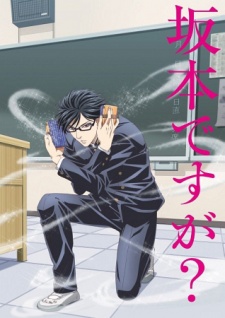
Anime has a problem with main characters. Every other show revolves around a protagonist who is, in no uncertain terms, perfect. They may have a semblance of imperfection, a throwaway trait like stupidity or being abnormally unlucky, but really when we look at the way they manage to pull every other character into their game, becoming the center of attraction or strategic lynchpin of any confrontation while making it all seem like unintentional, it becomes clear that their whole purpose is to dominate the screen, while everyone else just acts as their foil. They are strong, funny, charismatic, good at cooking, devoted, persistent; they are anything the story needs them to be. And the irony is, the more such dimensions the writers try to add, the more one-dimensional the character becomes.
Now what if that were the joke? Haven’t You Heard? I’m Sakamoto decides from the outset to cut all the crap and just introduce their character like he is: absolute perfection, packed into a stylish yet unassuming high schooler. Sakamoto is a master of any sport he tries, speaks French and possibly an untold number of other languages, has an aesthetic sense on par with modern art masters, and most importantly, he has a mind that can quickly determine his best course of action in an instant, no matter the circumstance. As his classmates begin to chase after him in droves, wanting to monopolize his perfection all to themselves, he becomes an Onizuka-esque character, leading them to understand their flaws and grow past them, all while remaining just out of reach.
His personality was well-chosen for the role he plays at the center of the story. Somewhat soft-spoken, never bragging but also never self-deprecating, and always exuding an air of authority and purpose, Sakamoto feels appropriate for a person as perfect as he is. When he speaks, his eyes always seem slightly misaligned, as if instead of talking to people he speaks through them, or as if he were a feudal Japanese emperor, speaking to no one in particular and leaving everyone around him to greedily lap up his every word for themselves. Besides his one extraordinarily ordinary friend Kubota, he maintains a thin social wall between himself and everyone else, bringing them to greater realization about themselves before disappearing to help the next person. Normally this would be an irritating way of handling this sort of story, tossing most characters aside after one or two arcs, but Sakamoto makes it work by being straight with its audience: this show is a comedy about watching Sakamoto being a superhuman. Him saving the other characters is an over-the-top comedic device to that end.
And over-the-top it is. Between Great Teacher Onizuka, Ultimate Otaku Teacher, and Assassination Classroom we’ve had our fair share of ridiculous “lessons,” but the difference here is how ordinary these antics become. Sakamoto will pretend to be possessed by a fox spirit, or jump from the real world into a TV screen, or compete with the class delinquents in physical competitions and games, and while everyone else acts surprised each and every time, he doesn’t even make a passing comment. It's hard to get attached to each and every story because Sakamoto himself seems detached from them, pulling everything together in a matter of moments without seeming to even try. And it’s okay that we don’t get attached to them, because they’re ultimately gags, designed to make us laugh rather than forcing us to sympathize. We know the formula by heart: everything seems to be hopeless, and suddenly Sakamoto appears with his superhuman plans in action, solving everything to an overly jazzy riff while everyone gasps in awe. Who cares that we know how the formula goes? It’s fun, and it never tries to be more than it is.
But in case it does feel repetitive, the episodes are thankfully split into two or three parts apiece, which each provide a good 8-10 minutes of fun. I’m not sure why they decided to make the show into full-length episodes by putting multiple stories together, as a web series of single-story episodes would have been easier to enjoy. Like with the more well-known and masterful gag work Nichijou, watching more than one story at a time feels unnecessary, but after a week I would always find myself ready for a new one. Now that Sakamoto has finished airing we can do just that.